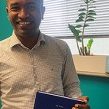
Tewodros Hailemariam
PhD - Couples HIV Testing in Ethiopia: exploring attitudes, beliefs, experiences and acceptance among heterosexual couples living in Addis Ababa
Mode of study: Full-time
Country: Ethiopia
Previous Education: Master of Public Health (MPH), Bachelor of Science (Environmental Health)
Before joining the PhD program, Tewodros worked for seven years as an assistant lecturer, lecturer, and assistant professor at the School of Public Health, College of Health Sciences and Medicine, Wolaita Sodo University, Ethiopia. He currently works as a Data Analyst at the NSW Health COVID-19 Public Health Response Branch.
Why did you join the UNSW School of Population Health?
I was motivated to join the UNSW PhD program because of the school’s leading global reputation, its high-profile supervisors, and its scholarship opportunities.
What was the focus of your PhD and why did you choose this?
My research focused on heterosexual couples in Sub Saharan Africa, with an emphasis on Ethiopia, and the intention to utilise Couples HIV Testing and Counselling (CHTC). I examined how individuals in a couple make a decision when it comes to undertaking HIV testing and provided essential material for understanding the experiences of service-users’ preferred approach to HIV testing for the purposes of increasing uptake of couples-based HIV testing, which is ongoing policy and program emphasis in the region.
What was the outcome?
The key findings showed that couples have a positive sentiment to CHTC services. However, there are concerns about ramifications - including break-up and abuse - if the test result is HIV-positive for either of the partners. The study also found that third parties, such as religious leaders and parents, encouraged or pressured the couple to undertake CHTC. Such involvement compromises the fundamental principles of HIV testing, which are voluntariness and privacy. Therefore, it was determined that initial testing as an individual, followed by CHTC testing, was a way to overcome concerns.
What did you enjoy the most about the PhD process and why?
In this journey, I have enjoyed working with my supervisors, who are highly experienced in the field and incredibly supportive of my growth as a researcher in this program
What was the most challenging and how did you overcome this?
The journey was not free of challenges. I missed my family, especially in the first two years. I was very lucky to have other PhD students as friends. We could share our pains and pleasures in this journey to overcome our challenges.
What's next?
COVID-19 has changed how we live and plan our tomorrow, but I am very keen to take on these new challenges and approach my research career with an open mind. Next I would like to pursue a postdoctoral path or work in the public health research industry.
- Publications
- Awards
- Grants
- Media
